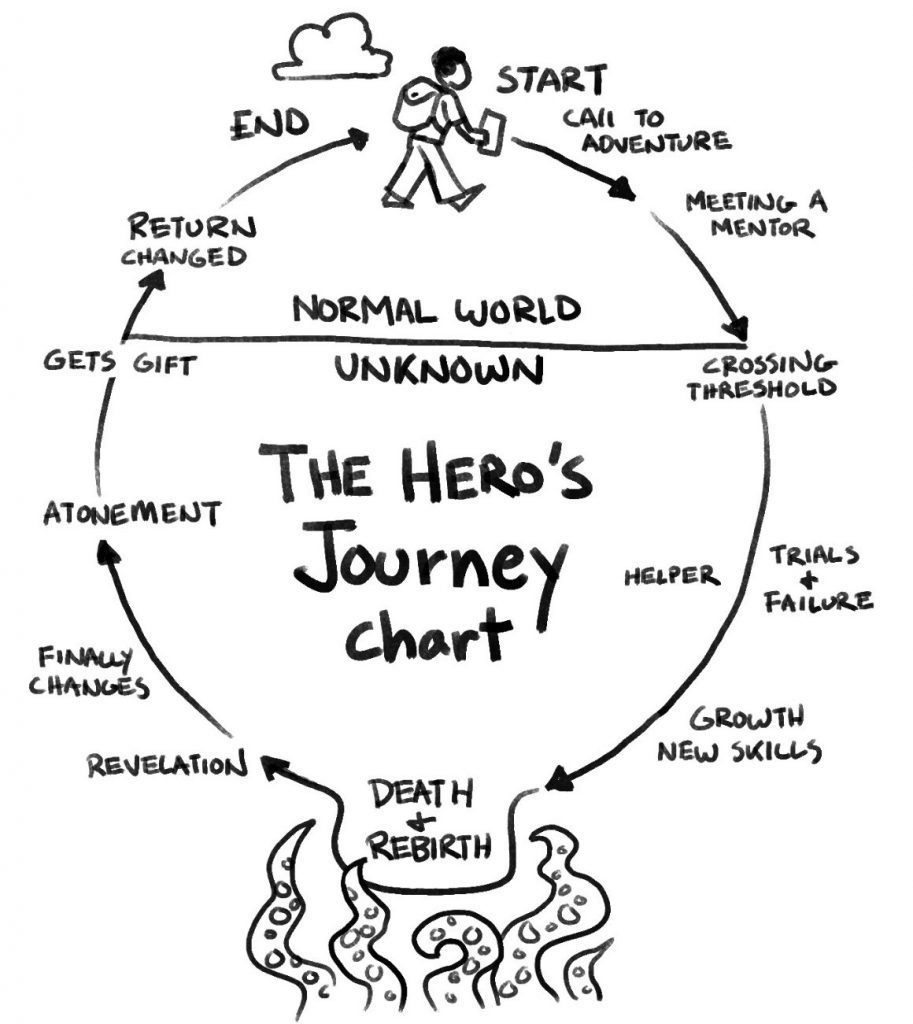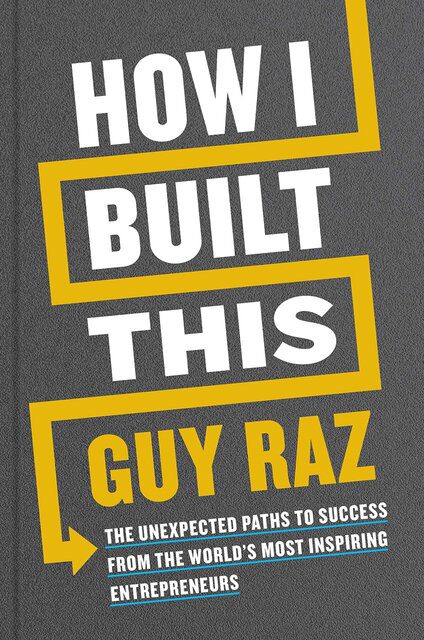“Starting a company is like throwing yourself off the cliff and assembling an airplane on the way down.” – Reid Hoffman
Print | Kindle(eBook) | Audiobook
One of my favorite podcasts on Entrepreneurship is NPR’s How I Built This with Guy Raz. I have been a fan and ardent listener of the show since 2016. Guy Raz dives into the stories behind some of the world’s best-known companies. The Podcast weaves a narrative journey about innovators, entrepreneurs, and idealists—and the movements they built Through the interviews,
Guy asks the entrepreneurs about their journey, the peaks and valleys, and their entrepreneurial journey’s ups and downs. My favorite part of every podcast episode is the way he can humanize these great entrepreneurs.
Award-winning journalist and NPR host Guy Raz has interviewed more than 200 highly successful entrepreneurs to uncover amazing true stories like these. In How I Built This, he shares tips for every entrepreneur’s journey: from the early days of formulating your idea, to raising money and recruiting employees, to fending off competitors, to finally paying yourself a real salary.
“Whatever you do, do it well. Do it so well that when people see you do it, they will want to come back and see you do it again, and they will want to bring others and show them how well you do what you do.” – Walt Disney
Here are my favourite takeaways from reading, How I Built This: The Unexpected Paths to Success from the World’s Most Inspiring Entrepreneurs by Guy Raz.
How I Built This began as an idea, Guy had back in 2008 when he took a class at Harvard Business School during a sabbatical year as a Nieman journalism fellow after nearly eight years as a foreign correspondent. He spent the next seven years hosting Weekend All Things Considered and then TED Radio Hour.
First Episode
“I still remember my very first interview for How I Built This, which we released in September 2016. Sara Blakely. The inimitable, indefatigable billionaire founder of Spanx. She was a huge get for us. And she was placing a tremendous amount of trust in me. I believed in the concept of the show and in my abilities as an interviewer and a host, but this was still my first foray into a show exclusively about entrepreneurship, and it was still very much an experiment. Sara had graciously agreed to be the guinea pig, and I didn’t want to blow it.”
“Starting a business—starting anything creative, for that matter—is difficult. It is a twisting road with hours, days, weeks, and months filled with struggle and failure and self-doubt and even tears. When you add a sense of isolation to the mix, it’s “Hello, anxiety!”
- Every year, roughly 850,000 new businesses are established in the United States. Of them, 80 percent will make it to percent will make it to their first anniversary. Most of those will be non-employer businesses, meaning it’s just one person, in the proverbial garage, trying to make their dream come true.
According to studies out of Duke University, the Kauffman Foundation, the Founder Institute, and Northwestern:
The average entrepreneur is actually 40 years old when launching his or her first startup–and the average age of leaders of high-growth startups is 45 years old.
Hero’s Journey
Most of Guy Raz interviews are themed around the “hero’s journey,” the concept—identified by the author and philosopher Joseph Campbell—that most great epic stories follow a similar narrative arc: a hero has a crazy idea; people doubt her; she leaves the village to pursue her vision, faces untold obstacles, falls into an abyss, barely escapes death, but manages to come out the other side with whatever she was looking for and continues on her journey to an eventual triumphant return.

ENTREPRENEURSHIP ISN’T VERY NATURAL.
It defies many of our most human instincts. Our desire for security. Our fear of crazy risks. Our tendency to go with the flow and not make too many waves. As much as we think of ourselves as unique individuals, we also like to fit in and to be chosen—by those who fit in and were chosen before us.
And yet, there is always that one person we know who goes the other way.
Who embraces a different set of instincts. The kind that have driven humans for millennia to leave home, to push boundaries, and to build. For most of history, we have called that kind of person an explorer. But in the twenty-first century, with the frontiers that are still open for exploration no longer physical, but technological, social, intellectual, and economic, we have given that person a new name: entrepreneur.
“Entrepreneurs aren’t chosen, they are made. Self-made. You could be an entrepreneur.”
The Entrepreneur
- The entrepreneur is a person who strikes out on their own to reach these frontiers of progress, aware of both the risks and the rewards of going it alone. They are driven to discover what might be found out there. They feel the call to make something out of what they find—something new, better, faster, more efficient—and to make it accessible to the rest of us in a way that we can use. It could be a product or a service or an idea that spurs its own kind of exploration, starting the cycle anew.
Ideas
- Good ideas are hard to find and hard to get right. But once you find one, they are also very hard to turn away from. That’s what makes good ideas so intimidating. Not that you won’t ever find one, but that one day you will, and when you do, it’s very possible that your life will never be the same again.
Dangerous vs Scary
“Why is it that so many of us are so bad at differentiating between things that terrify us and things that present a real hazard?
- We’re scared of flying, but we have no problem zipping down the highway in our cars at eighty-five miles per hour, even though you’re eighty-six times more likely to die in a car accident than a plane crash; the odds of which are nearly 1 in 10,000, which itself is three times less likely than choking on food.
- We’re afraid of letting our children go in the ocean on summer beach days because of sharks, but we demand they take baths on a regular basis, even though bathtubs claim one American life every day and sharks claim only one per year on average.
Failing is scary. Wasting your life is dangerous.
Having a fall back Plan
- For Sara Blakely, the billionaire founder of Spanx, selling fax machines was her fallback. For Mark Cuban, internet entrepreneur and Daymond John’s fellow shark, it was bartending. The founder of JetBlue Airways, David Neeleman, knew that if his idea for a low-cost airline that flew out of big markets didn’t take off, he could always go back to being a travel agent.
- Having a fallback plan does not mean you are building an escape hatch from your dream. It’s not an excuse not to try hard, nor is it a ready-made reason to quit. It just means you’ve given yourself a cushion at the bottom of your entrepreneurial leap of faith so that if you do crash, you can bounce back to fight another day.
Curiosity and Coincidence
- But just as often, it is a consequence of curiosity and coincidence. Someone goes looking for something that they are sure already exists—a product, a service, a TV show, even a video game, it doesn’t really matter—only to discover that it is nowhere to be found. So they start talking about it in casual conversation to whoever will listen—friends, family, Uber drivers, baristas, professional acquaintances—and they learn that they are not the only one who has been looking for this thing and has come up empty-handed.
- Then, in realizing that they are not alone, something else happens: the absence of this thing evolves from a minor inconvenience in their life to a real-world problem that, in their estimation, needs to be solved. And they have an idea for how to solve it.
Find Your Co-founder
- Partners don’t just help your idea survive the fickleness of consumers, the ruthlessness of competitors, the scrutiny of investors, or the uncertainty of world events. They help you survive as well. And if your idea is ever to become a real business, it needs you alive and kicking. Which means it needs your partner—your co-founder—too.
Acknowledging privilege and recognizing advantage are essential to understanding the nature of success—both yours and others.
Iterate, Iterate, Iterate
- iteration—the incremental evolution of a product or service. It is a phenomenon that is natural to innovation and foundational to the development of products as they come to market and vie for the attention of discerning (and often distracted) consumers.
- Typically, there are two phases to the iterative process prior to launch. The first involves tinkering with your idea until it works and you, as its creator, are satisfied with what you have. The second entails exposing the working idea to the public and tweaking the product based on their feedback until it catches on—either with a buyer, a major investor, a retail partner, or a critical mass of your customers.
Manage Partnership Tensions
- Companies are like families. From the outside they all look similar and sometimes sort of boring, but on the inside they’re all uniquely complicated. They have very specific ways of doing things that seem peculiar to anyone else. They have rules and traditions and terminology that mean a lot to them and define significant aspects of how they function. They also have weird internal rivalries and quarreling cliques.
- They have baggage and secrets and skeletons in their closets. And with all of that shared history, they end up constructing a shared identity; a common banner they can wrap themselves in during good times or rally around through tough stretches, whether they have to come together to accomplish a mission or respond to a threat
“In the military there is a saying: “Proper preparation prevents poor performance”—the five Ps. In business, you might say, “Product plane crashes produce partnership problems”
Luck
Guy ends every interview on How I Built This by asking the guests to what extent they feel luck played a part in their success, compared with things like hard work and skill and intelligence.
“Not because I think there is a right answer, or even that there is an answer at all, but because in attempting to answer this question, they must take a moment to reflect. After spending many hours walking me through every little detail of their entrepreneurial journey—from the call of their idea for a business to the all-is-lost moments they were able to overcome, all the way to their present-day involvement in the company they have worked tirelessly to shape—founders have a chance to think one more time about everything we’ve just talked about, everything they thought about before coming into the studio, and to reevaluate how all the pieces of their story fit together. Almost without fail, this question has produced some of the most revealing parts of the interviews.
Luck, when it comes right down to it, is really just an opportunity waiting to be taken advantage of, and they took advantage of it.
Some Profiled Entrepreneurs in the Book
- Angie’s BOOMCHICKAPOP.
- Randy Hetrick of TRX,
- Stewart Butterfield – slack
- Chef and restaurateur José Andrés” – Jaleo
- Lisa Price, – Carol’s Daughter
- Sam Adams beer, Jim Koch, ”
- Micheal Dell – Dell Computers
- Daymond John 0 FUBU
- Phil Knight – Nike
- Herb Kelleher- South Western Airline
- Jane Wurwand, the creator of Dermalogica,”
- Ben & Jerry’s, Ben Cohen and Jerry Greenfield.
- Jen Rubio, Luggage company Away
- Adam Lowry and Eric Ryan. household cleaning product manufacturer Method
- Whitney Wolfe – Bumble
- Tobi Lütke, the founder of Shopify,
- Katrina Lake, Stitch Fix
All the best in your quest to get better. Don’t Settle: Live with Passion.
#100BooksReadingChallenge2021 Order on Amazon: Print | Kindle(eBook) | Audiobook



1 Comment
Pingback: 100 Books Reading Challenge 2020 – Lanre Dahunsi